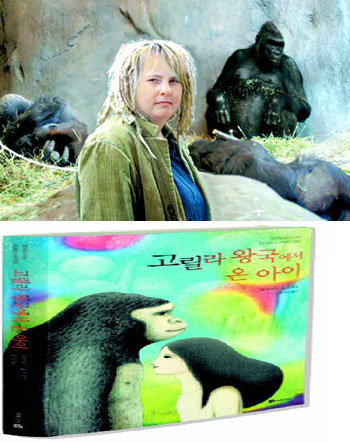Gorilla Awakens Autistic Girls Spirit
Gorilla Awakens Autistic Girls Spirit
Posted February. 11, 2006 10:53,

Songs of the Gorilla Nation, published in 2004, tells the story of the rescue of an autistic girl who has been unable to communicate with others since she was young, and who was living a difficult life, by a gorilla.
Because of her autism, she was viciously attacked at an early age, and at 16, she dropped out of school and left home, living on the streets. She became a stripper, whose sole source of comfort was her lonely behavior of dancing. She danced in a glass box and men would insert coins to watch her.
It was a gorilla, not a person, who rescued her from the loneliness created by the pressure of normalcy. When her spirit had become a spectacle for the worlds twisted people, locked up behind bars, a caged gorilla reflected her spirit like a mirror.
Through that gorilla, the autistic girl, who is the books author, rediscovered herself. She realized the dreams of her youth and is currently working as an anthropology professor.
This book is not a success story on the treatment of autism through animals. The author still suffers from autism. However, she learned to coexist with other people by using her condition as one way of regarding the world. This book is about how, through the help of the gorilla, the author was able to escape the dark life brought to her by autism and portrays the process of entering the beautiful world of autism in a moving way.
The author is a high-capacity autistic, possessing normal language ability and intelligence, but who lacks communication skills, is absorbed in repetitive behavior, and is extremely sensitive. With such qualities, the author roamed around until she was 36, ignorant that she was even autistic, and it wasnt until after she randomly took a trip to the zoo that she had an experience that would totally change her life forever.
She felt that the way a person regards a gorilla is the same way she had been regarded. She observed the gorilla in a way she would never even conceive of doing among other people, and started to understand the minds of people.
One day when the gorilla, Nina, afflicted with nephritis, refused to eat, the gorillas Pete and Judy threw a tree branch at Nina. Spectators started shouting that the gorillas were fighting, but Nina eventually got up and started to eat, and Pete and Judy watched her in a satisfied manner. Caring about another being, anger, humor, religious sensibilities; she learned about all of these things from the gorillas, and she started to consider herself in a positive manner. She recalled her dreams as a young girl of becoming an anthropology scholar, and with a newfound passion, she embarked on this dream.
The gorilla that the author repeatedly mentions and cannot forget is Congo. One day when she was in a bad mood, she went in front of Congos cage, and as she shed tears, Congo gave her a shoulder on which to cry. Having directly experienced Congos dignity and concern for others, she was able to understand people in a way she had never thought possible.
After singing You Are My Sunshine at Congos funeral, she took a fistful of Congos fur instead of his ashes, which were transported to America after the autopsy, and returned it to Africa. Then she began to let herself flow into the world and let it flow back into her. The result was her meeting her lover, Tara, and through artificial insemination, she had a son, Terrick.
Unlike when she was young, the ability to express in writing the marvelous and terrible things that couldnt be shared with other people and the resulting descriptions of the sympathy she shares with the gorillas is beautiful. The author, who at eight years old felt that her life was over, is now able to say:
I feel like I am a bridge between past and future generations, autistic and normal worlds, and apes and humans. Anyone who demonstrates their highest potential can feel this way. Its like when you learn a song perfectly by heart. Even if you dont see the words or melody, the song flows out by itself. The song of the gorilla kingdom is like that. I sing this song every day.
Hee-Kyung Kim susanna@donga.com







